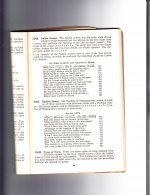I can only imagine that when you say the links I post are too out of date to be useful, and aren't relevant, it's directed at me.
You might be forgetting I'm not in England, as a cultural reference, I'm in North America, the Niagara Peninsula.
When does irrelevance become obsolete, and when does obsolete become archaic?
And for me, somewhere in there, is the collectable and antique.
While I can appreciate your reference to language study, creating an Americanized form of English is different.
For me, as a North American, that makes General English, or Standard English, obsolete, with English history as archaic.
As far as Proper English being about legal and personal responsibility, American English is about plausible deniability.
I'm not going to get into a treatise about what callous means, thinking of it in medical terms myself,
but for me, "Victorian earnestness" is more about the ladies of langour and the Chinese opium war and tea from India.
The younger generation is an age bracket, but I see "a sort of flippancy or callousness" as being texting and hand-held device use,
not generational, but technology users.
Here's another scan of this American Plain English handbook.
It might not be a best seller, but if American politicians, judges, lawyers and civil servants used it,
it was very influential.
I'm having a difficult time deciding which page to scan, so I'm using an obvious one with Shakespeare.
As you can see, they are equating Shakespeare with Italian sonnets, something you might boo-hoo about.
Here in North America, it is generally understood that Shakespeare used the book "Tales of the Decameron",
by Giovanni Boccaccio, as the basis for his writing style and plot lines.
As far as the American language being used to denigrate other countries,
saying Shakespeare wrote some of the Holy Bible is popular.
When you are supplying new technology to government employees, such as typewriters,
dictating what form of Americanized English you should use, and the desired standard of typing layouts,
you can subvert an entire history, not only of language, but of reality.
The Merriam-Webster dictionary and the Encyclopedia Britannica were first created by Scottish people.
I would call them authentic as for history, new discoveries and all global and scientific understandings.
Here in North America, Americans subverted that with the Websters' dictionary, saying Noah Webster, as if it was the same.
I can read about a Dr. James Watt in a new printing as authorized by President George W. Bush and Prime Minister Margaret Thatcher,
and see a man I don't know about, not his actual history at all.
When I showed that to friends they agreed, seeing such a short bio, but they said he looks like a family member of mine.
As far as modern English people acceding to American use of the former English language,
you can look at the attack on Grenada, a small island that had 147 soldiers with rifles,
by the United States of America and England, that they called a war, as proof of that.
Yes, it's only getting worse, sonnetising a little, when verse becomes adverse.




